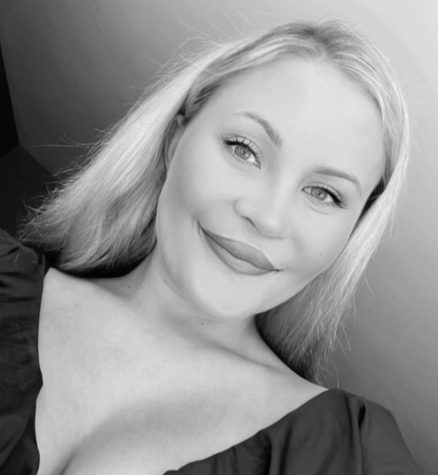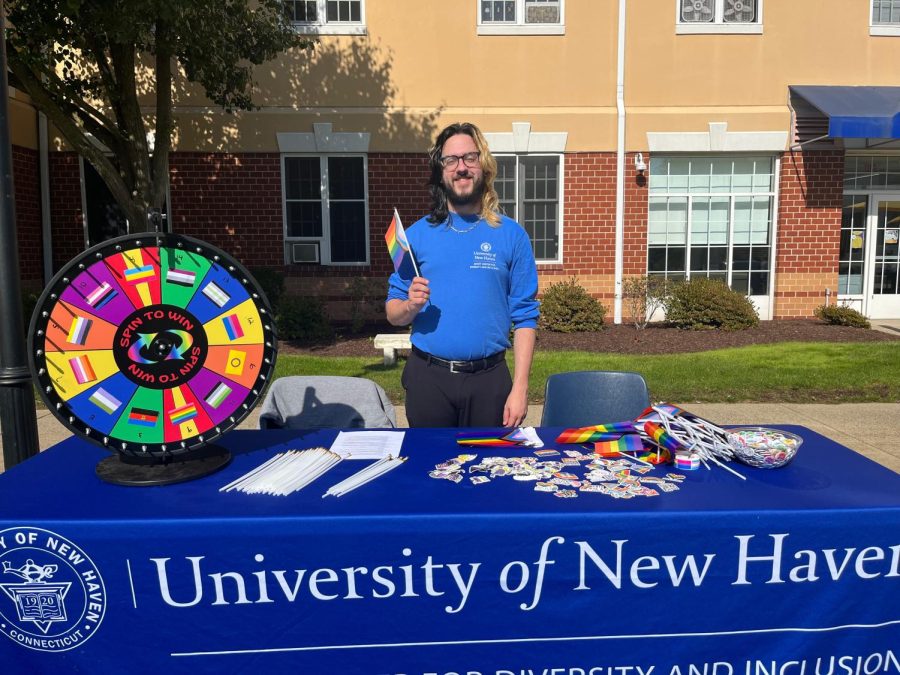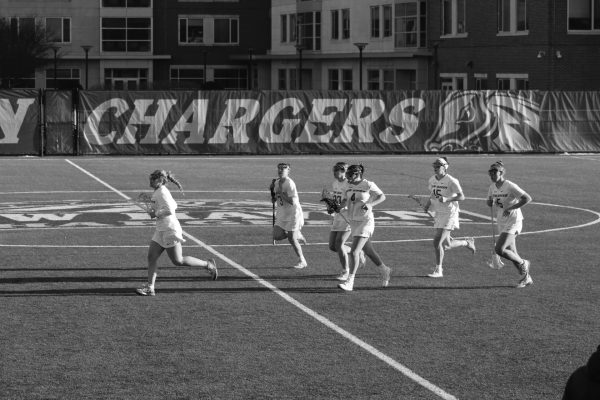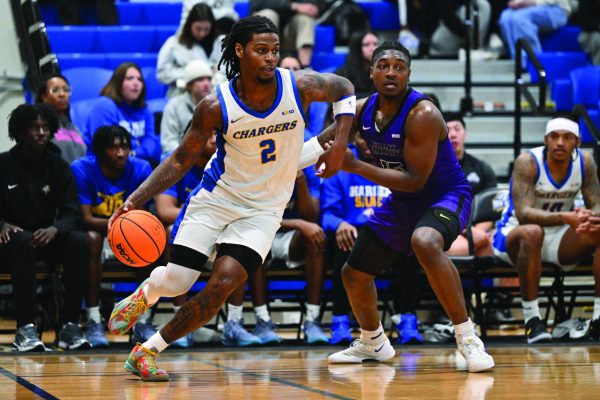Division of Student Affairs hosts first Health and Wellness fair
Photo courtesy of Charger Bulletin/Saige Batza.
Assistant Director of LGBTQ+ Resources at the Myatt Center Ian Shick at their table during the fair, West Haven, Oct. 12, 2022.
On Wednesday, the sun shone bright in the crisp autumn air as tables were set up in the Bixler/Gerber residential quad for the first annual Health and Wellness fair hosted by the Division of Student Affairs. Multiple external and university organizations attended this event, including USGA, Counseling and Psychological Services (CAPS), the Myatt Center for Diversity and Inclusion, Health Services and the Beckerman Recreation Center. The event kicked off with lively and upbeat music provided by the university’s radio station, WNHU.
Diane Polo, associate director for health and wellness education and prevention, emphasized the importance of personal well-being within the university’s student population. She said, “We acknowledge that health and wellness are critical factors in having academic success. Therefore, we wanted to host this kick-off event to set the pace for the rest of the semester and upcoming health and wellness initiatives and programming. We wanted to host this event early enough in the semester so that students could become familiar with the various resources available.”
Polo also highlighted that the event was aimed to encourage students to seek help in managing their mental and physical health. She said, “The event’s goal was to allow students to become familiar with the resources on and off campus that may help them achieve their health and wellness goals. We know that every student’s goals and meaning of wellness may be unique. We wanted to bring as many different perspectives to wellness through these resources so that every student can find something that meets their needs.”
Eve Altieri, assistant director of Charger Rec, believes that health and wellness truly defines a campus community, especially at the University of New Haven. She said “A lot of students lose track of taking care of themselves when they come to college. College can be a really overwhelming experience, in a negative and positive way. There’s so many things going on so I think a lot of students forget to take care of themselves. Offering them resources to make it easier can really benefit the community.”
Altieri encouraged students to take care of their overall well-being by finding what works for their individual needs. She said, “I’m not going to say everyone should go to the gym because that’s not for everybody, but I think that we offer so many resources, and it’s important to find the niche of what you’re interested in.”
Jill Banatowski, medical director of the university’s Health Services, highlighted the fact that a healthy lifestyle contributes to the campus climate of the university because it is always at the forefront of students’ minds. She said, “Mental health was always a big issue for undergraduate and graduate students, and I think Covid made that even more accentuated. It’s really important for students to find that balance and find other things in their life that are important to them, like exercise, sleep and mindfulness.”
Banatowski emphasized that mental and physical health can often go hand-in-hand, saying, “We’re here to help them bridge the gap in terms of physical health, but so often that can be combined with some mental health issues that we work very closely with CAPS for.”
Paige Bartels, director of CAPS, emphasized how difficult it can be for students to manage their mental and emotional health given the circumstances of a regular college schedule. She said, “It is typically tricky to attend to all aspects of our overall health & well-being on a good day, and college presents many stressors that can make it even more difficult. However, when we are attending to our health and well-being, we are more likely to make good decisions, be in a place to engage in learning and discourse and have more positive relationships with others – all things which contribute to an overall healthier campus climate.”
Bartels also noted that students should try to make their own well-being a priority. She said, “Setting boundaries to ensure they are caring for themselves, asking for help & accessing resources when needed, and checking in on all areas of their lives – relational, physical, mental and emotional, spiritual, and academic, can all make a big difference in a student’s well-being and overall experience.”

Saige Batza (she/her) is a sophomore psychology major with a concentration in community and society. She looks forward to another year of hard work for...







